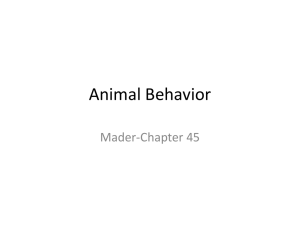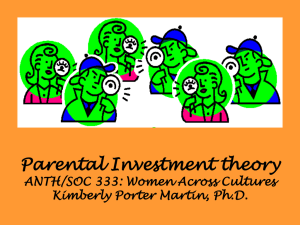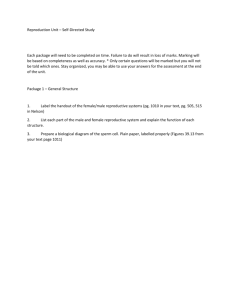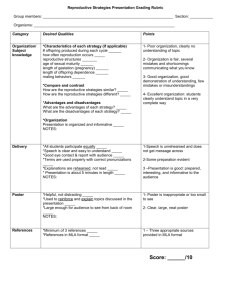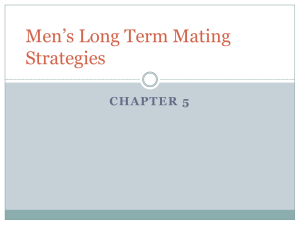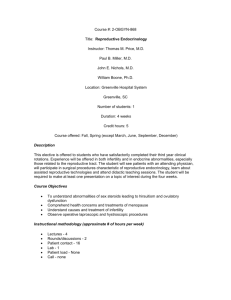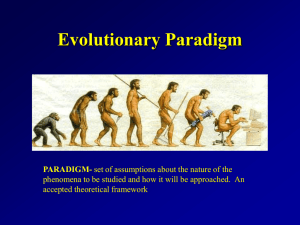Mating
advertisement
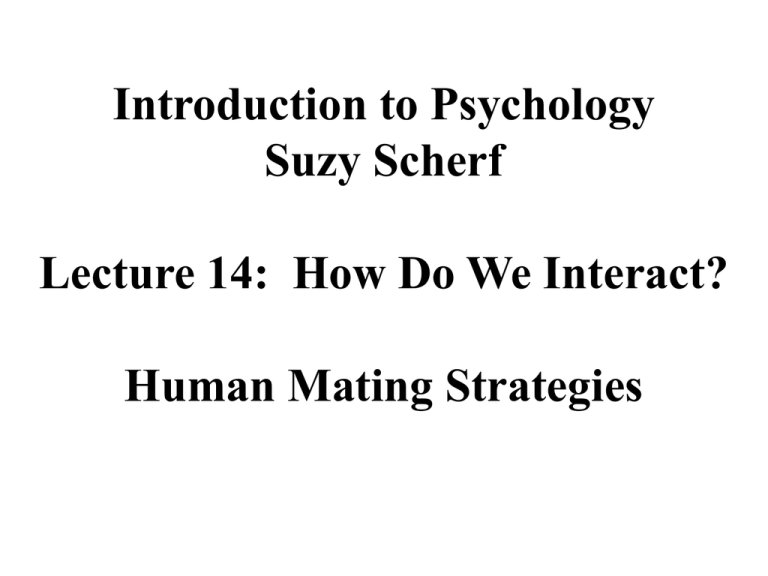
Introduction to Psychology Suzy Scherf Lecture 14: How Do We Interact? Human Mating Strategies Don’t Men and Women have the Same Mate Preferences? What if someone of the opposite sex approached you and began a conversation. You find this person attractive and pleasant to talk to. After a few moments of conversation they ask you either: 1. “Would you go out with me tonight?” 2. “Would you come over to my apartment tonight?” 3. “Would you go to bed with me tonight?” How would you respond? Don’t Men and Women have the Same Mate Preferences? 1. “Would you go out with me tonight?” Men: Women: % Yes, % No % Yes, % No 2. “Would you come to my apartment tonight?” Men: % Yes, % No Women: % Yes, % No 3. “Would you go to bed with me tonight?” Men: % Yes, % No Women: % Yes, % No Sexual Selection • Traits spread b/c they - • Sexual Selection favors traits that - • Often acts unevenly in the two sexes because of differences in _________________. Sexual Selection: The Peacock Sexual Selection • When males > females reproductive rate (most mammals): 1. 2. • Sexual selection favors traits that help increase the ____________ in the fast sex: • Sexual selection favors traits that help increase the _____________ in the slow sex: The Case of Humans Women can produce about 1 child/year • • in EEA probably limited to about • breast milk only food for infants Would increasing the number of partners increase her reproductive rate? The Case of Humans Men can produce an unlimited number of children/year • • Would increasing the number of partners increase his reproductive rate? The Case of Humans Men do tend to invest in their offspring • • In a perfectly monogamous system, the men’s and women’s reproductive rates would be _________. Human mating systems approach monogamy - Evidence for a Mostly Monogamous Mating System • In _____% of human cultures allow polygyny! • Prohibitions on polygyny are very recent (≈ 500 years) • Marital infidelity • Marriage, divorce, re-marriage The extent of polygyny = Sexual Selection in Humans • Members of the fast sex _________ • Members of the slow sex _________ • Because of a tendency toward weak polygyny: • • • Sexual Selection can ____________ that influence competition and choosiness behaviors Are Men More Competitive and are Women more Choosy? 1. “Would you go out with me tonight?” Men: 50% Women: 50% 2. “Would you come to my apartment tonight?” Men: 69% Yes Women: 6% Yes 3. “Would you go to bed with me tonight?” Men: 75% Yes Women: 0% Yes Are Men More Competitive and are Women more Choosy? Likelihood of consenting to intercourse 1. Women are more __________ than men. 2. Men aren’t ___________ 5 yrs Time Known 1 hr. How does Parental Investment Influence Mating Strategies? Parental investment - anything that a parent does for a particular offspring that ______ the offspring and ____________________ to invest in other offspring. • • • • __________ investment in humans • most likely to evolve in species with - How does Parental Investment Influence Mating Strategies? • Parental investment is different for men and women • Women have obvious ________________ • Men do not make the ____________________, but do invest with other resources • Women make _____________ and ____________ investments in their offspring, while men only invest ________________ How does Parental Investment Influence Mating Strategies? Any trait that _____________________________in women should be selectively preferred in men. Any trait that helps a woman _________________________________will spread! Any trait that indicates __________________________should be selectively preferred in women. Mating Preferences in Men and Women Physical Attractiveness: Perceptions of attractiveness have been shaped by evolution as indicators of fitness Correlates of Fitness that shape our attractiveness judgments many are indicators that the person is not too stressed by _____________ 1. 2. 3. 4. 5. Mating Preferences in Men and Women Physical Attractiveness: Symmetry Face Symmetry Face Symmetry Face Symmetry Face Symmetry Face Symmetry Face Symmetry Mating Preferences in Men and Women Physical Attractiveness: Men and women have equal criteria for attractiveness What’s Different between the Sexes? • • Across cultures, men overwhelmingly - Mating Preferences in Men and Women Why do men place a higher emphasis on physical attractiveness? • Physical attractiveness is an indicator of physiological health - • Attractiveness is an indicator of - Mating Preferences in Men and Women What other indicators of potential fecundity do men attend to in mate selection? How attractive is this woman? How attractive is this woman? How attractive is this woman? Waist-Hip Ratio WHR = WHR = WHR = Waist-Hip Ratio is Related to Fecundity • Higher WHR is correlated with __________ and higher susceptibility to a range of ________________ • High WHR reflects a low level of __________ - as in pregnancy women, prepubescent girls, and postmenopausal women • Really low WHR probably does not exist in nature Waist-Hip Ratio is Related to Fecundity • An increase from .7 to .8 in WHR results in a ____% decrease in likelihood of pregnancy • A woman’s WHR does reflect her - Mating Preferences in Men and Women When might women place a high emphasis on the physical attractiveness of their mate? • • Sneaker-strategy Mating Preferences in Men and Women What kind of traits to women place as a higher priority for mate selection than do men? • • WHY? Sex Differences in Reproductive Strategies 1. Reflect differences in reproductive rate – 2. Reflect mate preferences - 3. Women looking for __________ and ___________ resources in men 4. Men looking for ____________ Sex Differences in Reproductive Strategies 5. Women’s genes and investment 6. Men’s genes and investment - As a result, there is an asymmetry between men’s and women’s _____________________ Sex Differences in Parental Confidence How confident are you in your ability to identify your own offspring? •Women (and her relatives) are _______% confident in her ability to identify her offspring •Men (and his relatives) are ___________% confident in his ability to identify his offspring Sex Differences in Parental Confidence: Women •Since a man’s investment and his genes are not automatically linked, - •This opportunity to recruit these resources separately results in a _______________________ Sex Differences in Parental Confidence: Women •Women trying to get the best of both worlds •A strategy focused only on getting the best genes or only on getting the most resources from men is not as successful as a _________________ Women’s Mixed Reproductive Strategy A woman playing a mixed reproductive strategy will accept genes and resources from different men! Sex Differences in Parental Confidence: Men •Since men never have complete parental confidence they risk being cuckolded •Cuckoldry - • There is some selection pressure on men to - Men’s Mixed Reproductive Strategy A man playing a mixed reproductive strategy will invest heavily in one partner and her offspring but still attempt to attract additional mates. Mixed Reproductive Strategies If you ask about men’s and women’s selectivity across several characteristics and many levels of involvement: 1. Women set higher standards than men - 2. Setting high standards eliminates potential mates - Mixed Reproductive Strategies 3. Women set higher standards on attractiveness for - 4. Overall, both men and women set the highest standards - 5. Men relax their standards on all characteristics for their - Counter-Strategies Men’s and women’s mixed reproductive strategies are often in ________________ with one another. How do men and women’s mating strategies deal with this competition? Both men and women have developed ___________________ in their mating strategies such that men are sensitive to _____________ and women are sensitive to men’s _______________________ Counter-Strategies: Men Men have to avoid investing in offspring that aren’t genetically related to them. Men have evolved a counter-strategy to giving investment where there are no genes. 1. 2. Counter-Strategies: Men Men rate _________________________ characteristic in a long-term mate and ___________________ as the most negative trait in a long-term mate! On the other hand, men don’t show a preference for fidelity in a _________________ mate. Counter-Strategies: Men • In fact, men are ___x more likely to divorce a woman if he has low paternity certainty in their children and they are much less likely to invest in these children after the divorce! • Women intuitively know this about men and seem to use this sensitivity to the risk of cuckoldry in competing for mates. Counter-Strategies: Women • When a man invests in another woman and her offspring, - • Women have also developed counter-strategies to defend against - Counter-Strategies: Women • Women are much more threatened by - • Emotional infidelity is a stronger signal to women that - Facultative Influences on Reproductive Strategy Why are some individuals so jealous? Why do some women seem to lower their reproductive fitness by having many sexual partners? Why don’t some men invest at all in their offspring? Facultative Influences on Reproductive Strategy One essential factor may be ___________________________________________ In particular, the abundance of investing men predicts the - Facultative Influences on Reproductive Strategy Lots of Investing Males Women Men Few Investing Males Facultative Influences on Reproductive Strategy In fact, children show lasting responses to the presence or absence of a father as an indication that investing males are scarce. • Girls reared in father-absent homes - • Boys reared in father-absent homes - Facultative Influences on Reproductive Strategy Adult’s expectations about the necessity of male paternal investment influence their mate-attracting strategy. • Women who believe that investing males are scarce - • Women who believe that there are an abundance of investing males - Facultative Influences on Reproductive Strategy Adult’s expectations about the necessity of male paternal investment influence their mate-attracting strategy. • Men who believe in the scarcity of investing males - • Men who believe that there are an abundance of high investing males - Facultative Influences on Reproductive Strategy • When men and women assume male investment to be rare in the population, they both show - • When men and women assume male investment to be frequent in the population, they behave in ways that -
